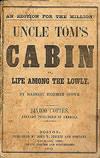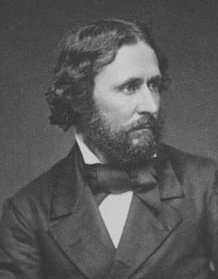The Compromise of 1850 robbed the political parties of distinctive appeals and contributed to voter apathy and disenchantment. Although a colorless candidate, Democrat Franklin Pierce won the election of 1852 over Winfield Scott, the candidate of a Whig party which was on the verge of collapse from internal divisions. Once the Compromise of 1850 seemed to have settled the territorial controversy, Whigs and Democrats looked for new issues. The Democrats claimed credit for the nation's prosperity and promised to defend the compromise. Whigs, however, could find no popular issue and began to fight among themselves. Their candidate in 1852, Winfield Scott, lost in a landslide to Democrat Franklin Pierce, a colorless nonentity.
Pierce was known as a “doughface,” a northerner with souther sympathies, friendly to slavery. The Whigs were divided among those willing to compromise on territorial issues and the free soilers who opposed the extension of slavery by any means. The Republican Party, which came into existence during the Pierce administration, capitalized on the decline of the Whig Party, which was divided over slavery. In 1852 the tradition of small third parties continued with the Free Soil Party, who nominated John Hale, but their minimal support did not affect the election.
Free Soilers and Free Blacks. Personal liberty laws in North and Black laws in North and South create all kinds of restrictions on free Blacks in lower northern states: marriage, property, voting military service all restricted. Still, Fugitive Slave searches anger many northerners; interference angers Southerners. Movement for freedom was rarely a movement for equality for Blacks (see Lincoln); some political parties went farther than others: Free Soilers not as liberal as Liberty Party; Anti-slavery Whigs; few parties clean on objectives; most Free Soilers, Republicans were ambivalent on black rights.
 Uncle Tom's Cabin. The publication of Harriet Beecher Stowe's novel "Uncle Tom's Cabin" also heightened sectional tensions. Like other northerners, the Fugitive Slave Law stirred Stowe's conscience, and her novel drove home the evils of slavery. While Stowe knew little about slavery and her picture of plantation life was distorted, her story had sympathetic characters and it was told with sensitivity. She was the first white American writer to look at slaves as people.
Uncle Tom's Cabin. The publication of Harriet Beecher Stowe's novel "Uncle Tom's Cabin" also heightened sectional tensions. Like other northerners, the Fugitive Slave Law stirred Stowe's conscience, and her novel drove home the evils of slavery. While Stowe knew little about slavery and her picture of plantation life was distorted, her story had sympathetic characters and it was told with sensitivity. She was the first white American writer to look at slaves as people.
The characters in the book include Tom, an intelligent, pious and courageous slave; the evil slave-owner Simon Legree; Augustine St. Claire, a kind owner; his sensitive daughter Eva who admires Tom; the runaway slave Eliza and her husband George and other provide a melodramatic but moving picture of “Life Among the Lowly”—which is the subtitle.
When Abraham Lincoln met Harriet Beecher Stowe, he is said to have remarked: "So you're the little lady who wrote the book that started this big war." Apocryphal or not, the book had a big impact on attitudes both North and South.
Franklin Pierce as President: The Distraction of Foreign Affairs
The “Young America Movement.” Foreign affairs offered a distraction from the growing sectional hostility. Sympathies were extended to European revolutionaries in revolt against autocratic governments. Some Americans dreamed of territorial acquisitions in Mexico, Central America, and the Caribbean as a means of spreading democracy. Young America was a volatile combination of altruistic motives and nationalist ideas, related to the concept of Manifest Destiny. Although the ideas bore little fruit in the 1850s, they did provide a diversion.
The need for better communication with California produced the Clayton-Bulwer Treaty. It gave the United States and Britain joint control of any canal built through the isthmus. The appeal of an Isthmian Canal was strong, but the engineering required for such a feat was still several decades away.
In response to growing pressure from various southern quarters for the annexation of Cuba to offset the addition of California, American ministers to Great Britain, France and Spain met in Ostend, Belgium, and drafted a proposal outlining the purchase of Cuba from Spain. It proposed to purchase the island for $120 million suggested taking it by force if Spain refused. The Ostend Manifesto was published and drew immediate criticism on northerners, who saw it as a way to expand slavery.
One initiative that did bear fruit was the visit of Commodore Matthew C. Perry to Japan. In 1852 Perry sailed into Tokyo harbor with four American warships, presented Japanese officials a letter from President Fillmore proposing the initiation of formal relations between the United States and Japan. Perry returned to Japan two years later, and a formal trade and friendship agreement between the two nations was signed, thus beginning a long and sometimes troubled relationship between the two countries.
One other foreign affairs matter was settled in 1853. As plans were being drawn up for a transcontinental railroad, one possible route included territory to the south of the states of Arizona and New Mexico. Ambassador to Mexico James Gadsden negotiated the deal, and a swath of land from Las Cruces, New Mexico to Yuma, Arizona, that included what would become the city of Tucson, was purchased from Mexico. The purchase completed the territory that would become known as the "lower 48 states."
|
THE ELECTION OF 1856 Fremont v. Buchanan: A Critical Election in a Critical Year |
 |
The 1856 United States presidential election reflected the bitter divisions in the country over the issue of slavery. Because of the unpopularity of the Civil War in Kansas, the Democratic Party rejected incumbent President Franklin Pierce and nominated James Buchanan (right), who had been out of the country as an ambassador during much of the furor over the Kansas-Nebraska issue and therefore had no record of comments on those events. The Republican Party, which had arisen out of the ashes of the Whig party, which had split over differences between its northern and southern components, nominated John C. Frémont, known as The Pathfinder because of his explorations over the Rocky Mountains and into California. His motto was “Free soil, free labor, free men, Fremont.” The American party, known as the Know Nothings because of their refusal to answer questions about their goals, nominated Millard Fillmore, who claim to be a compromise candidate. As an ardent Democrat, Buchanan had been favorable toward the south, what is the crisis over slavery grew sharper, he became more of a Unionist. But because he did little to address the divisions that were becoming extremely bitter, he is generally judged to be one of the worst American presidents. The nation was disintegrating around him, and he did little to try to stop it. When Lincoln was elected in 1860 and the southern states began succeeding, he did nothing, arguing that it was now Lincoln's problem, even though he would not be inaugurated until March. |
||
The Rise of Stephen A. Douglas, the “Little Giant.”
Senator Stephen Douglas saw the needs of the nation in a broad perspective. He advocated territorial expansion and popular sovereignty. He opposed slavery, but did not find it morally repugnant. Generally, he did not think it was necessary for the nation to expend its energy on the slave issue. Both parties endorsed the Compromise of 1850 in the 1852 campaign, but the Whig party was disintegrating and proslavery southerners were coming to dominate the Democratic party.
Douglas's part in the passing of the Kansas-Nebraska Act is discussed elsewhere, but it is worth keeping in mind that he was one of the most influential political figures of the 1850s. Probably best known for his participation in his debates with Abraham Lincoln and the Illinois Senate race of 1858, he nevertheless had a substantial impact on events during that decade. His victory in the 1858 Senate election did not, however, propelled him to victory in the presidential election of 1860. In fact, his debates with Lincoln were probably a factor in his loss.
